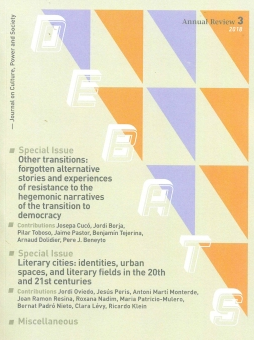Progress and the planet’s limits: some lessons for the 21st century from the debate between Godwin and Malthus
Resum
A debate emerged at the end of the 18th century; essentially, the same one we are now discussing regarding the limits of growth. Condorcet (1793–1794) asserted that human improvement would never stop. He ruled out the possibility of the finitude of the planet becoming a barrier with arguments that, in today’s language, refer to hopes that threats are distant in the future and of ecoefficiency, dematerialisation, and postmaterialism. Condorcet invented sustainable development as a side thought! Godwin (1793) supported the idea and added that unending progress would be possible only by abolishing government, property, marriage and their associations in order to liberate the individual, thus creating a world without war, crimes, law courts and government, disease, anguish, melancholy, resentment, death, or sex. It is hardly surprising that this anarchist and individualist paradise on earth is similar to the Christian concept of heaven: the dominance of spirit over matter has been a basic belief of industrial society since its very beginning. Malthus (1798) rose against these dreams, saying that nature represents an insurmountable obstacle to their realisation, that necessity and the “imperious law of nature” restrains every organism, even humans, “within the prescribed bounds”—an idea that earned him Darwin’s praise and the enmity of many social philosophers. Malthus argued that Godwin’s vision of society, although beautiful, was unfortunately based on three errors: (1) that all social ills come from institutions; (2) that eliminating property would give rise to unending wealth; and (3) that equal sharing will always solve material shortages. Even in its literal terms, this debate anticipated a lot of today’s current discussion about sustainable development and degrowth, as well as the ecology–equity relationship.Descàrregues
Descàrregues
Publicades
Com citar
Número
Secció
Llicència
Sense perjudici del que disposa l'article 52 de la Llei 22/1987 d'11 de novembre de Propietat Intel·lectual, BOE del 17 de novembre de 1987, i conforme a aquest, els/les autors o autores cedeix/en a títol gratuït els seus drets d'edició, publicació, distribució i venda sobre l'article, per tal que siga publicat a Debats. Revista sobre cultura, poder i societat.
Debats. Revista de cultura, poder i societat es publica sota el sistema de llicències Creative Commons segons la modalitat “Reconeixement – NoComercial (by-nc): Es permet la generació d’obres derivades sempre que no se’n faça un ús comercial. Tampoc no es pot fer servir l’obra original amb finalitats comercials”.
Així, quan l’autor/a envia la seva col·laboració, accepta explícitament aquesta cessió de drets d’edició i de publicació. Igualment autoritza Debats. Revista de cultura, poder i societat la inclusió del seu treball en un fascicle de la revista perquè es puga distribuir i vendre.











